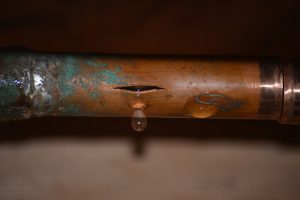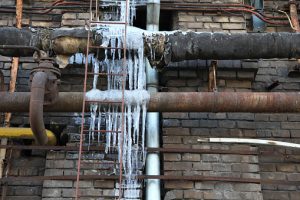With the cold winter weather upon us, homeowners must be aware of the possibility of frozen pipes and the resulting water damage that can occur if the hazard is not dealt with quickly and properly. Luckily, frozen pipes can be remedied and avoided altogether with a few simple steps.
Frozen Pipe Prevention

Once outside temperatures reach the freezing point, the water inside your pipes is at risk for freezing as well. Pipe location plays a part in the likelihood that the water inside will freeze. Pipes that are exposed to the outdoor air, such as swimming pool lines, hose bibs, water lines that are located in unheated areas of the home such as basements and garages, and lines that run along non-insulated exterior walls, are more likely to freeze. When water freezes, it expands by 10%, putting pressure on whatever contains it. As the water inside a pipe continues to freeze and expand, it creates a buildup of water pressure that will eventually cause the pipe to become compromised and “burst,” leaking water onto the surrounding areas. Frozen pipes can often be identified by the “clanking” or banging sound made when the water inside them is freezing and expanding, and subsequent water dripping may be audible as well. Additionally, an abnormally small trickle of water coming from a sink faucet is another indication of a frozen pipe.
The water damage caused by a frozen pipe that bursts can be quite devastating, costing thousands of dollars in home repair and loss of property. Water leaking from a burst pipe can damage floors, carpeting, walls, furniture or other possessions located near the affected pipe. The cleanup associated with this type of disaster can be very difficult and lengthy.
Take Action When Pipes Freeze

If one or more of the pipes in your home are frozen, follow these tips:
- Apply heat to the frozen pipe(s). You can use an electric hair dryer or heating pad, a space heater, or cloths soaked in hot water to warm the pipe and thaw the ice within.
- If the pipe has not burst, once you start to treat the frozen pipe, keep the faucet turned on so that running water can assist in melting the ice.
- If you cannot access the pipe or you cannot get it thawed, contact a professional plumber immediately in order to avoid a burst pipe and its consequences.
Note: If you are dealing with a burst pipe, immediately turn off the main water valve. This valve is typically located in the utility room or somewhere in the basement of the house. You’ll want to call a professional plumber to assess and repair the damage to your pipe(s).
